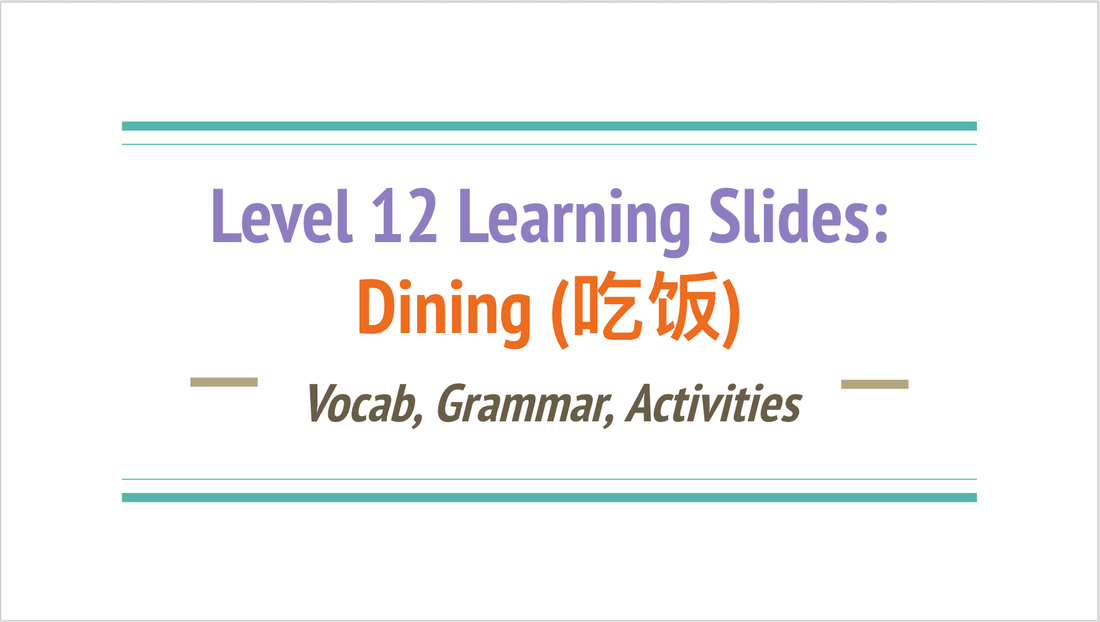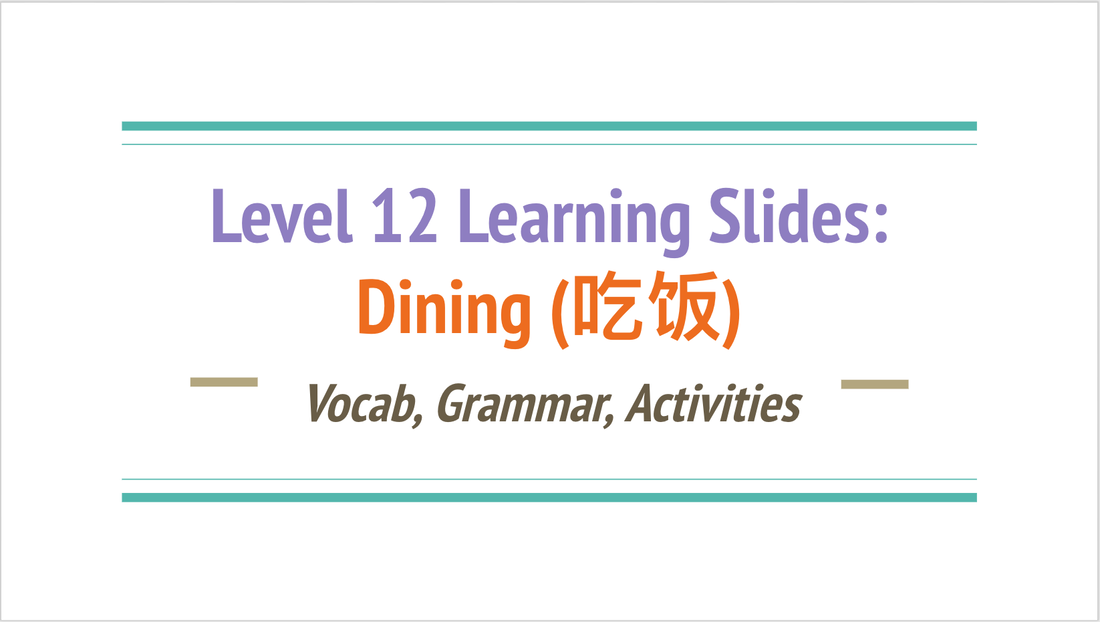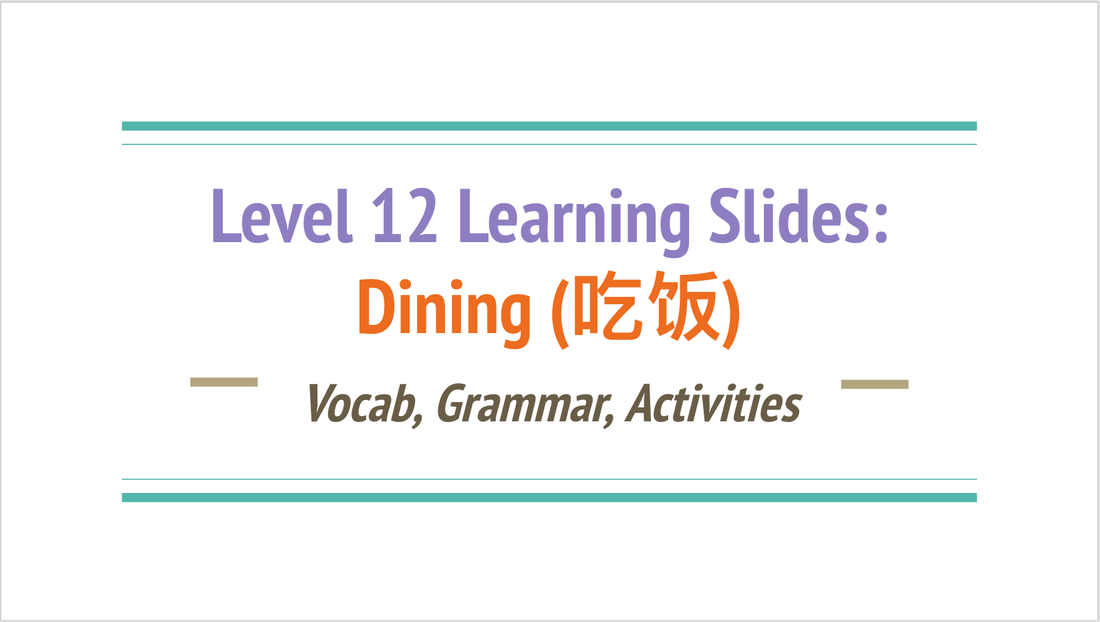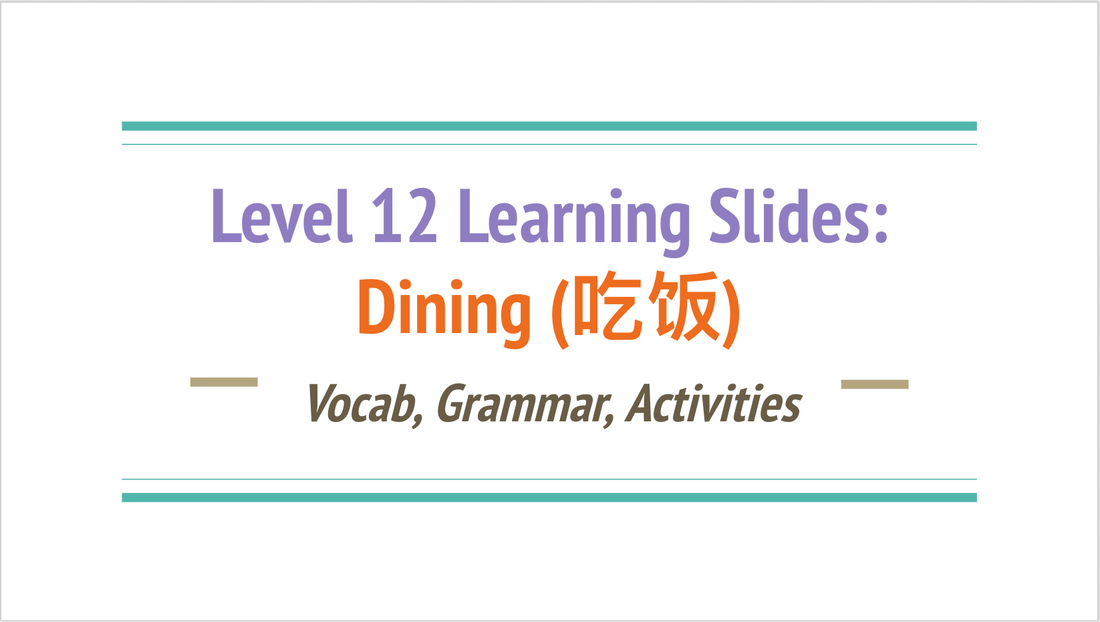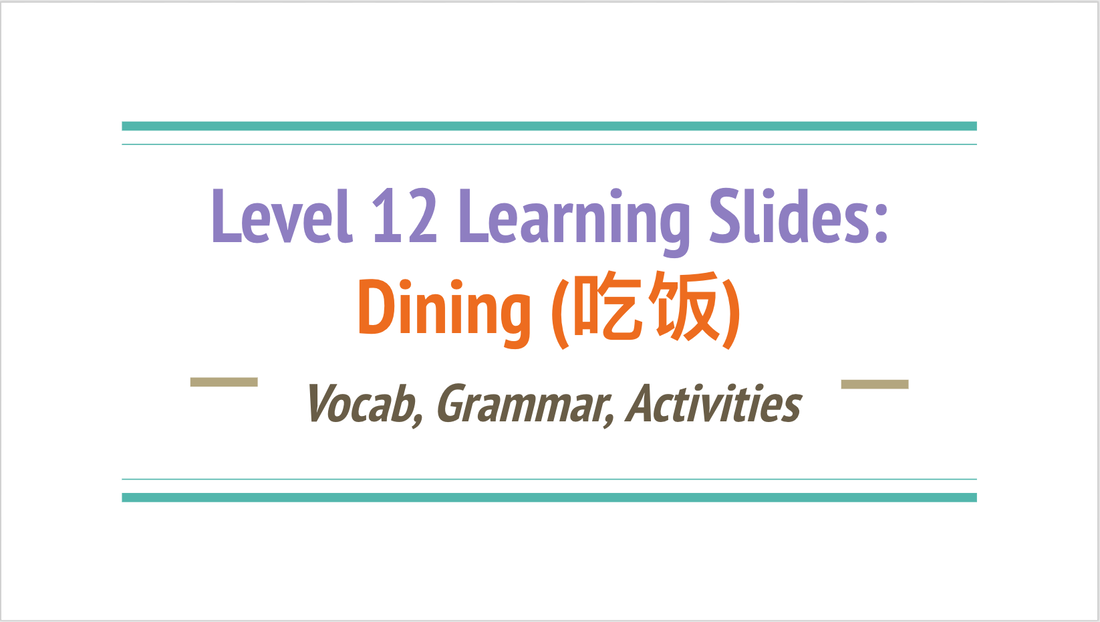Chapter 9: "Inn of Ghosts"
HOW TO ASK FOR A SEAT IN A RESTAURANT
Preview
Lesson
Practice
Mastery
Preview
|
|
好像 (hǎo xiàng) [v] to seem; to be like; it seems
位子 (wèi zi) seat 桌子 (zhuō zi) table 一...也/都...不/没有 not even all...; not even one...
Examples: 1. 这个饭馆好像一个位子都没有 = In this restaurant it seems there's even one seat 2. 我今天没钱,一块钱都没有 = I didn't ring money today, not even one dollar do I have 3. 如果你想睡好觉,就不能喝咖啡,一杯咖啡都不能喝= If you want to sleep well, you can't drink coffee, not even one cup 4. 他看了很多件衬衫,一件也不喜欢,一件都没买 = He saw a lot of shirts, didn't like even one, didn't buy even one 5. 一个都不能少 = Not even one less [Movie Title] Sentences:
|
Lesson
Practice
Mastery
DICTATION: write the Chinese characters, English definition, and pinyin (including tones):
GRAMMAR: complete the following exercises:
READING: read aloud the following sentences:
SPEAKING: perform the following role-play:
- 位子,桌子,好像
- TARGET: no more than 1 mistake, including tones.
GRAMMAR: complete the following exercises:
- Translate: It seems like there's not one seat left.
- TARGET: no mistakes.
READING: read aloud the following sentences:
- 人怎么这么多?好像一个位子都没有了。
- 服务员,请问,还有没有位子?
- 有,有,有。那张桌子没有人。
- 两位想吃点儿什么?
- TARGET: no more than 1 mistake, including tones.
SPEAKING: perform the following role-play:
- Ask if there are seats available in a restaurant (there don't seem to any)!
- Explain to the customer there are still seats available at a specific table.
- TARGET: at least a 3 on ALL tasks.
Chapter 10: "Kung Fu Panda"
HOW TO COMPLAIN ABOUT RESTAURANT SERVICE
Preview
Lesson
Practice
Mastery
Preview
|
|
|
服务 (fú wù) [adj] service
上菜 (shàng cài) [vo] to serve food
Result Complements
NOTE 1: 了 very often appears with result complements, as 了 marks completed actions, and as you'd expect a result complement is usually about a completed action. 了 comes after the result complement, as the verb+result compound can't be separated.
NOTE 2: The negative form of a result complement is usually formed with "没有" [because it's negating a completed result]. Do NOT use "不."
Examples:
1. 小白菜卖完了。= The baby bok choy is sold out [完=result complement].
2. 你找错钱了。= You gave me the change incorrectly [错=result complement].
3. 功课做好了,我要睡觉了。= My homework is done [好=result complement], I want to go to bed.
4. 那个人是谁你看清楚了吗? /那个人我没看清楚。 = Can you see clearly who that person is? / No, I can't clearly see that person.
见 (jiàn) [complement] "achieved"
到 (dāo) [complement] "achieved"
Examples:
1. 我看到了。OR 我看见了。= I saw it.
2. 你听到了吗?OR 你听见了吗?= Did you hear it?
3. 我没有听到。OR 我没有听见。= I didn't hear it.
错 (cuò) [complement] wrongly
清楚 (qīng chǔ) [complement] clearly
- 服务员,请问,还有没有位子?
上菜 (shàng cài) [vo] to serve food
- 不要别的了,这些够了。服务员,我们都饿了,请上菜快一点儿。
Result Complements
- A "result complement" is a complement that's used to describe or clarify the result of a verb's action.
- > SUB + VERB + RESULT COMPLEMENT (+ OBJECT)
- The use of result complements is an essential feature of the Chinese language. Generally speaking, result complements are necessary as long as an action produces a certain result.
- In English, we have separate verbs to describe actions depending on their outcome. You can look, but not see, or listen, but not hear. In Chinese, verbs tend to be of the 'look' and 'listen' variety - the result isn't included like it is in 'see' and 'hear'. So if you want to indicate the result, you have to use a result complement.
- There are endless examples of these 'attempt' or 'procedure' verbs in Chinese which don't include an outcome. The majority of Chinese verbs are like this, in fact. For example:
- > 看 means 'to look' but doesn't include the result 'to see'.
- > 写 is similar to the English verb 'to write', in that it doesn't specify what the result of writing was (e.g. whether it was correct or not).
- All of these verbs need a result complement to describe a complete action with its result.
- Whether a verb can or should be combined with a result complement is not random, but rather follows certain set patterns. It's best to memorize each "verb + result complement" as a set phrase.
- See the Chinese Grammar Wiki for more info.
NOTE 1: 了 very often appears with result complements, as 了 marks completed actions, and as you'd expect a result complement is usually about a completed action. 了 comes after the result complement, as the verb+result compound can't be separated.
NOTE 2: The negative form of a result complement is usually formed with "没有" [because it's negating a completed result]. Do NOT use "不."
Examples:
1. 小白菜卖完了。= The baby bok choy is sold out [完=result complement].
2. 你找错钱了。= You gave me the change incorrectly [错=result complement].
3. 功课做好了,我要睡觉了。= My homework is done [好=result complement], I want to go to bed.
4. 那个人是谁你看清楚了吗? /那个人我没看清楚。 = Can you see clearly who that person is? / No, I can't clearly see that person.
见 (jiàn) [complement] "achieved"
到 (dāo) [complement] "achieved"
- The result complements "到" or "见" indicate that the outcome of the verb is achieved - what its result is. Without a result complement, the sentence would describe only the action itself.
- To illustrate, 看 (kàn) "to look" is the action of turning your head in a particular direction and focusing your eyes, whereas 看到 (kàn dào)," to see," is the result of your brain taking in the visual input.
- It may sound a little hokey, but it really is possible to "look but not see," and Chinese makes a clear distinction between the action and the result.
- See the Chinese Grammar Wiki for more info.
Examples:
1. 我看到了。OR 我看见了。= I saw it.
2. 你听到了吗?OR 你听见了吗?= Did you hear it?
3. 我没有听到。OR 我没有听见。= I didn't hear it.
错 (cuò) [complement] wrongly
- 师傅,钱你找错了,多找了我一块钱。
清楚 (qīng chǔ) [complement] clearly
- A: 对不起,我没有看清楚。B: 没关系。
Lesson
Practice
SKIT: in a group, write a dialogue about a waiter and customer at a restaurant. Memorize your skit and perform in front of the class!
WRITE: write a letter of complaint to the owner of a restaurant you visited recently. You were very unhappy with the service provided!!! Explain why.
- The customer is very dissatisfied with his/her restaurant experience.
- The waiter fields multiple complaints with a forced smile...
WRITE: write a letter of complaint to the owner of a restaurant you visited recently. You were very unhappy with the service provided!!! Explain why.
Mastery
DICTATION: write the Chinese characters, English definition, and pinyin (including tones):
GRAMMAR: complete the following exercises:
READING: read aloud the following sentences:
SPEAKING: perform the following conversation tasks:
- 服务,上菜,错,清楚
- TARGET: no more than 1 mistake, including tones.
GRAMMAR: complete the following exercises:
- Rule (in English): Explain what a "result complement" is. Describe its specific structure and when it should be used. Give examples of result complements.
- Puzzle (in English): list the three types of complements we've learned so far, and give examples of each.
- Translate: I'm sorry, our baby bok choy was just sold out.
- Translate: No problem, the dish can be made very quickly.
- Translate: Sorry, I didn't see [it] clearly.
- TARGET: no more than 2 grammar mistakes.
READING: read aloud the following sentences:
- 服务员,请问,还有没有位子?
- 看错了。
- A: 对不起,我没有看清楚。B: 没关系。
- 不要别的了,这些够了。服务员,我们都饿了,请上菜快一点儿。
- TARGET: no more than 1 mistake, including tones.
SPEAKING: perform the following conversation tasks:
- Complain about the restaurant service, including long wait times.
- Complain about the waiter.
- Ask to rush an order.
- TARGET: at least a 3 on ALL tasks.
Chapter 11: "The Furious Five"
HOW TO TALK ABOUT SOLD OUT ITEMS
Preview
Lesson
Practice
Mastery
Preview
|
|
刚 (gāng) [adv] just
完 (wán) [complement] finished 卖完了 (mài wán le) [vc] sold out ["finished" selling] 好 (hǎo) [complement] "successfully or properly finished"
Sentences:
|
Lesson
Practice
Mastery
DICTATION: write the Chinese characters, English definition, and pinyin (including tones):
GRAMMAR: complete the following exercises:
READING: read aloud the following sentences:
SPEAKING: perform the following conversation tasks:
- 刚,完,做好
- TARGET: no more than 1 mistake, including tones.
GRAMMAR: complete the following exercises:
- Rule (in English): Explain the differences between 刚 vs. 刚才. Give examples of each.
- TARGET: no mistakes.
READING: read aloud the following sentences:
- 对不起,小白菜刚卖完。
- 没问题,菜很快就能做好。
- TARGET: no more than 1 mistake, including tones.
SPEAKING: perform the following conversation tasks:
- Explain that a dish has been sold out (or not). Discuss why.
- TARGET: at least a 3 on ALL tasks.
Chapter 12: "Dragon Warrior"
HOW TO PAY AT A RESTAURANT
Preview
Lesson
Practice
Mastery
Preview
|
|
|
|
买单 (mǎi dān) bring the check/bill
我请客 (wǒ qǐng kè) My treat
AA制 (AA zhì) [phrase] split the bill/go dutch
忘 (wàng) to forget
带 (dài) to bring, to take
A找B[X]钱 (A zhǎo B qián) [phrase] A finds [change] for B
Sentences:
我请客 (wǒ qǐng kè) My treat
AA制 (AA zhì) [phrase] split the bill/go dutch
忘 (wàng) to forget
带 (dài) to bring, to take
A找B[X]钱 (A zhǎo B qián) [phrase] A finds [change] for B
Sentences:
- 师傅,糟糕,我忘了带饭卡了。这是十块钱。
- 找你三块三
- 师傅,钱你找错了,多找了我一块钱。
- 服务员!买单。
- 这次我请客,下次你再请。
- 我们AA制吧,各付各的。
Lesson
Practice
LEARN MORE: watch the preview videos about Chinese dining etiquette or paying for the bill. Write a paragraph summarizing what you learned!
SKIT: in a group, write a dialogue about two customers at a restaurant. Memorize your skit and perform in front of the class!
WRITE: write a story about paying for a meal at a restaurant based on the following picture:
SKIT: in a group, write a dialogue about two customers at a restaurant. Memorize your skit and perform in front of the class!
- The "host" prepares to pay for the meal.
- The "guest" argues with the host; fight over who pays!
- The "host" pays in the end..
WRITE: write a story about paying for a meal at a restaurant based on the following picture:
Mastery
DICTATION: write the Chinese characters, English definition, and pinyin (including tones):
READING: read aloud the following sentences:
SPEAKING: perform the following role-play:
- 买单,忘,带,找钱,请客,AA制
- TARGET: no more than 1 mistake, including tones.
READING: read aloud the following sentences:
- 糟糕,我忘了带钱了!
- (我) 找你三块三。
- 钱你找错了,多找了我一块钱。
- 服务员!买单。
- TARGET: no more than 1 mistake, including tones.
SPEAKING: perform the following role-play:
- Ask for the bill at a restaurant.
- Argue about who should pay for the bill.
- Admit that you forgot to bring money.
- Pay with cash and ask the waiter for change; give back the correct change.
- TARGET: at least a 3 on ALL tasks.
Chapter 13: "Master Shifu"
HOW TO ORDER IN A CAFETERIA
Preview
Lesson
Practice
Mastery
Preview
|
|
师傅 (shī fu) "master," respected worker
饭卡 (fàn kǎ) meal card 来(verb) (lái) to order [substitutes for "点" in restaurants/shops] Sentences:
|
Lesson
Practice
SPEAK: role-play a customer and 师傅 at a school cafeteria, ordering + paying for food.
WRITE: write a diary entry about your first experience eating in a Chinese school cafeteria.
WRITE: write a diary entry about your first experience eating in a Chinese school cafeteria.
Mastery
DICTATION: write the Chinese characters, English definition, and pinyin (including tones):
READING: read aloud the following sentences:
SPEAKING: perform the following role-play:
- 师傅,饭卡,来(菜)
- TARGET: no more than 1 mistake, including tones.
READING: read aloud the following sentences:
- 今天是星期四,学生餐厅有中国菜,师傅是上海人。
- 师傅,糟糕,我忘了带饭卡了。这是十块钱。
- 没有。你已经要鱼了,别吃肉了。来个凉拌黄瓜吧?
- TARGET: no more than 1 mistake, including tones.
SPEAKING: perform the following role-play:
- Order food in a cafeteria. [use “来”]
- Use your meal card to pay for a meal.
- TARGET: at least a 3 on ALL tasks.
MINIBOSS #3: ACT 3 REVIEWMastery Challenge 1 (Vocabulary and Grammar):
Mastery Challenge 2 (Speaking):
BONUS CHALLENGES:
|
© 2019 Hugo Xiong. [email protected]

